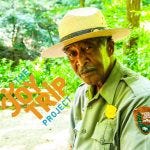Adventure photographers and filmmakers give us a unique view of the world. And throughout his long career taking pictures and telling stories for major magazines Peter McBride has offered up an exciting perspective, most often from the air. When he was in his 20s he flew a World War I biplane called the Vickers Vimy from London to Cape Town to reenact the first time an airplane traveled across Africa in 1920. "I think that really gave me an interest in the aerial perspective," he said in an interview with the Joy Trip Project. "I was able to sell it to National Geographic with some good luck and that led me into a decade of doing work for Geographic and other magazines." Through his camera McBride has shown us images of the planet most of us can only dream of. Having chosen a profession suited to his nature he admits that his work fulfills a selfish desire. "I guess I became a photographer more because I had an interest in seeing the world to be honest," he said. "I love photography, but I love adventures. I love exploring and I love going into the unknown." McBride’s work in photography provides us with an eye-opening look at the planet. He gives his viewers and readers the opportunity to see the place they call home in a different way. From the high mountains of the Himalaya to the jungles of the Amazon McBride has made it possible for to people to see how they and others interact with their environment and to observe their role in the natural order of things. But it’s in his most recent body of work that McBride turns his lens back toward the place where HE grew up. Flying high above the Rocky Mountains to Sea of Cortez he has been following the course of the great North American river, The Colorado. In a series of photo essays and feature films McBride now tells the story of the river that provides food and water for more than 10 percent of the U.S. population. The hardest working river in the world Colorado has flowed for more than 6 million years. But in the span of just a few decades its precious resources have been tapped to the breaking point. Returning to his home in Colorado Peter McBride is raising awareness for the importance of conserving water in the west. Through his films and still photographs he illustrates the plight of the Colorado and demonstrates the impact of over development and the abuse of our most precious natural resource. JTP: So I think it’s fair to suggest that you have been involved in different types of photo capturing all over the world, specifically what is it that made you come back to the United States and put so much effort into telling the story of the Colorado River? McBride: I think I came home…I still travel a lot for work today, but I came home in part because I was a little burned out to be honest. I was telling someone just last night that I wanted to try to do something that had a little more impact than just a magazine article that somebody reads going to the bathroom or something. You know…And that’s not entirely fair. Magazine stories can chance things for sure, but I guess I just wanted to sink my teeth into something that was bigger, maybe bigger than me. And I didn’t have a really huge master plan. It sort of evolved on its…as it happened and it still is. But I came home and wanted to do something just around home and not travel a bunch. I was traveling all the time and so I had to hunker down and I came back to the valley where I grew up. My father’s a pilot and I started looking at doing some aerial work. And that led into the Colorado River project that technically took me two years. But I’ms till doing tributaries. I’m still doing rafting and I’m still talking about it. It’s an issue that’s definitely not going away and it’s going getting more and more severe. JTP What can you tell me about what you discovered in your travels taking pictures of the Colorado River literally from its source to what had been its course to the sea? McBride:
© 2025 James Edward Mills
Substack is the home for great culture













Share this post